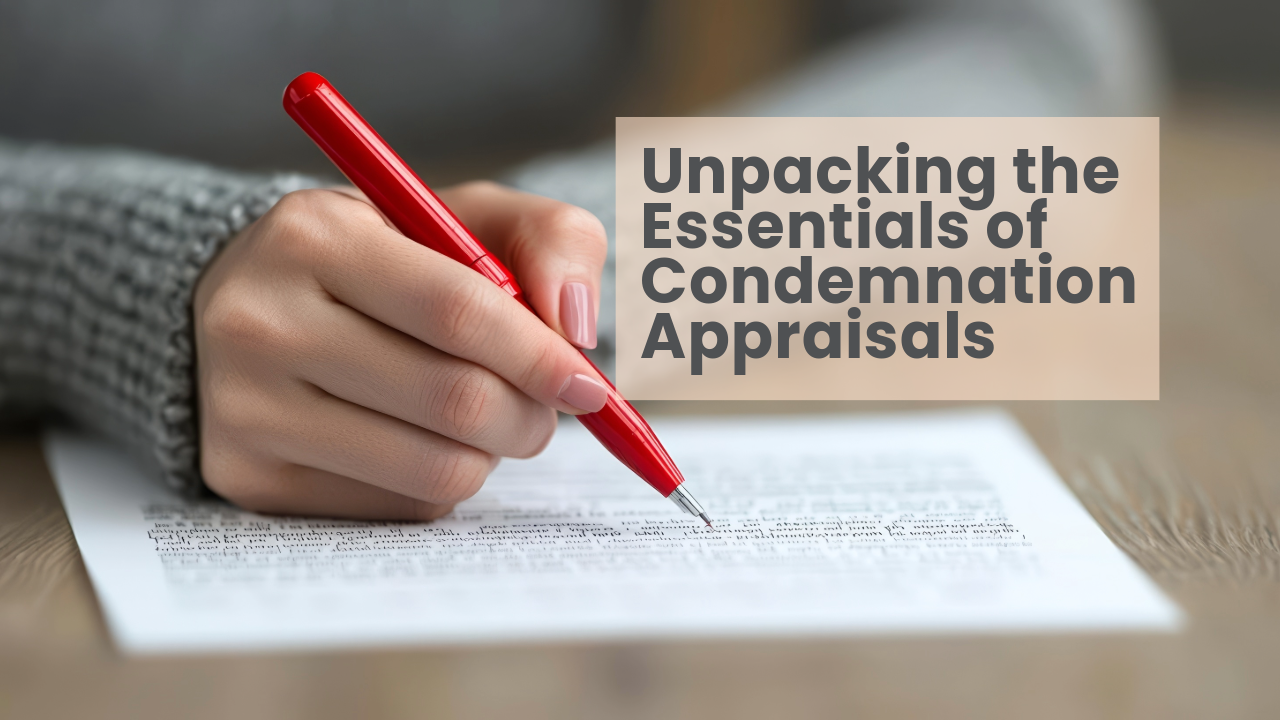Unpacking the Essentials of Condemnation Appraisals
Unpacking the Essentials of Condemnation Appraisals

Condemnation appraisals are a vital aspect of property rights, particularly when governmental entities seek to acquire private property for public use. Understanding the process and implications of condemnation appraisals can be crucial for property owners facing this situation. This post aims to clarify what condemnation appraisals are, why they matter, and how the process unfolds.
What are Condemnation Appraisals?
Condemnation appraisals occur when a government body exercises its right of eminent domain to take private property for public use. This can include projects such as building highways, schools, parks, or other infrastructure improvements. The law mandates that property owners receive just compensation for the fair market value of their property, so an accurate appraisal is essential to determine this value.
The Importance of Condemnation Appraisals
Condemnation appraisals play a significant role for several reasons:
Fair Compensation: Property owners deserve to be compensated for the loss of their property. An accurate appraisal ensures they receive just payment based on current market conditions.
Legal Protection: Appraisals provide a legally binding assessment that can be used in court if disputes arise. This protects property owners from being under-compensated for their property’s value.
Transparency in Process: The appraisal provides a detailed analysis of the property’s worth, helping property owners understand how the government arrived at the compensation amount.
The Process of Condemnation Appraisals
Understanding how condemnation appraisals work can empower property owners facing this situation. The process generally unfolds in several stages:
1. Initial Notification
When a government agency plans to acquire property, the owner will receive a notification. This document typically outlines the purpose for the acquisition and the government’s intent.
2. Appointment of an Appraiser
Next, the government will hire a qualified appraiser to conduct the valuation. Property owners may also choose to hire their own appraiser to ensure their interests are represented.
3. Property Inspection
The appraiser will conduct a thorough inspection of the property. This includes assessing the physical condition, features, and any improvements made over the years. It’s essential for the appraisal to reflect both the current state and potential uses of the property.
4. Market Analysis
After the inspection, the appraiser performs a market analysis. They will examine comparable properties in the area that have sold recently. Factors considered may include:
Recent Sales: Similar properties that have recently sold help establish a fair market value.
Current Listings: Active listings give insights into current market demand and pricing trends.
Public Use Impact: The appraiser will consider how the impending public use might affect property values in the surrounding area.
5. Valuation Report
The appraiser compiles their findings into a detailed report, which should include:
Appraised Value: A calculated figure representing the property’s fair market value.
Methodologies: An explanation of the valuation methods used and how they pertain to the specific property.
Comparable Sales: Data supporting the appraised value, including information about comparable properties and their sale prices.
6. Communication of Findings
Once the appraisal report is finalized, both the government agency and the property owner will receive copies. This report is critical in discussing compensation amounts and negotiating the final settlement.
7. Negotiation and Settlement
After presenting the appraisal, negotiations may occur between the property owner and the government. If both parties can agree on a compensation amount based on the appraisal, the process moves toward finalizing the transaction.
Understanding Your Rights
Property owners facing condemnation should be aware of their rights throughout the process. Each state has laws governing the process of eminent domain, including timelines for notification and the right to contest the government’s appraisal.
Choosing the Right Appraiser
Selecting a qualified appraiser is vital. Owners should seek appraisers who specialize in condemnation cases and have a solid understanding of local market trends and values. This expertise can make a significant difference in the outcome of negotiations.
In situations of condemnation, having a reliable appraisal can greatly affect the final compensation property owners receive. Understanding the process, the role of appraisals, and the importance of accurate valuations empowers property owners during what can be an emotional and challenging time.
Whether you’re facing a condemnation situation or simply want to learn more about the appraisal process, seeking guidance from experienced professionals can provide the support and clarity needed. Ensure you have the expertise on your side to protect your rights and secure fair compensation for your property. Contact us today for consultation.

